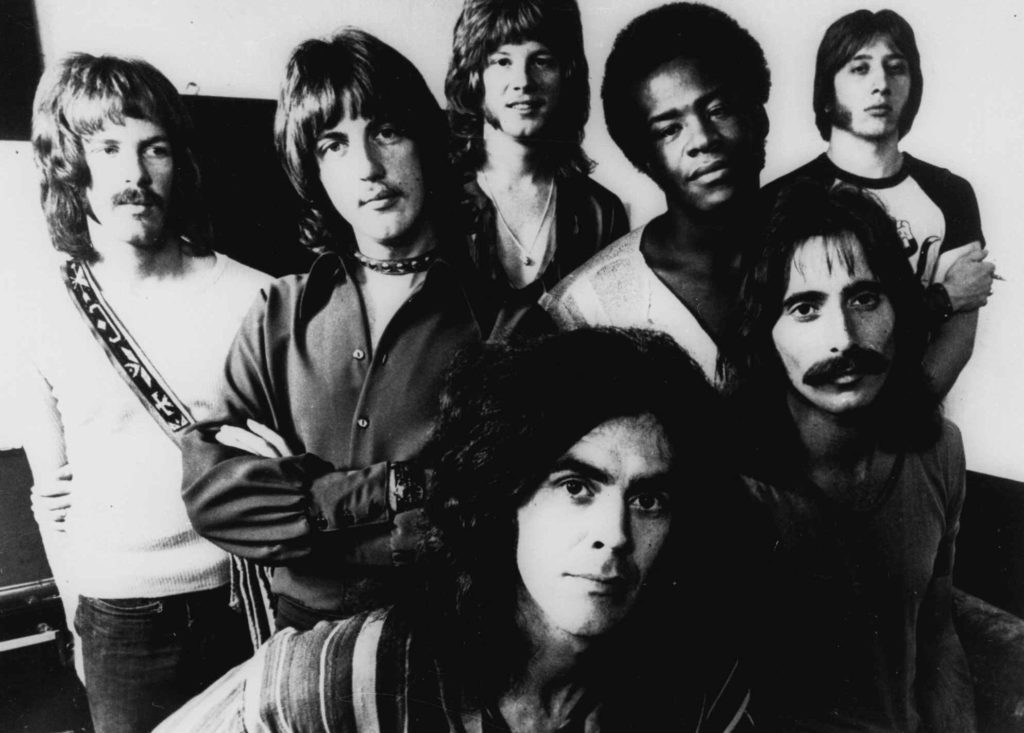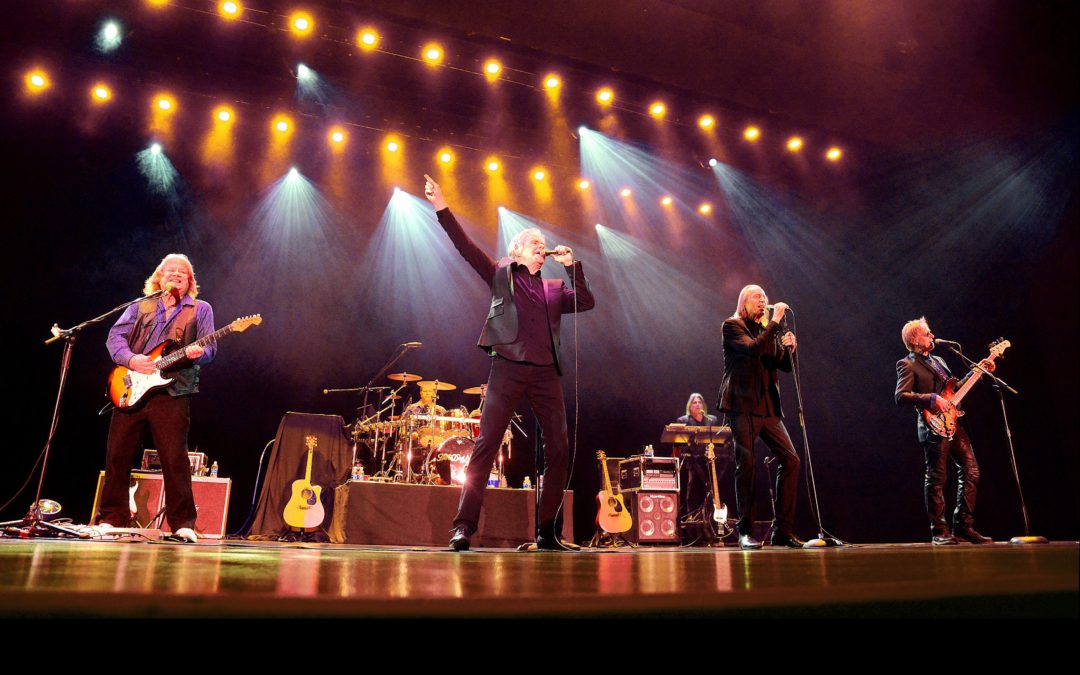(Three Dog Night’s current lineup continue to perform to sold-out crowds)
By Jeff Maisey
Music has always had a big impact on my life. As a child in the 1960s, I was exposed to my father’s record collection with an abundance of Herb Albert, Perry Como, and Dixieland Jazz.
Luckily, one of the kids on my dead-end street had older siblings, so by the age of seven I became aware of the sounds of The Beatles, Credence Clearwater Revival, Steppenwolf and others.
One group, however, seemed to stand out because I seemed to hear them everywhere I turned, from my handheld AM transistor radio to a television variety show. That group was Three Dog Night.
As it turns out, from 1969 to 1974, no other recording artist achieved more top 10 hits, moved more records or sold more concert tickets than Three Dog Night.
Some of those hits include “Eli’s Coming,” “One,” “Joy to the World,” “Liar,” “Old Fashioned Love Song,” “Black and White,” “Never Been to Spain” and “Mama Told Me (Not to Come).” Their upcoming album called “The Road Ahead” features the song “Prayer of the Children” and is scheduled to be released in February 2020.
I recently had the opportunity to speak by phone with founding singer Danny Hutton. Following is an excerpt from our conversation.
VEER: Three Dog Night’s 1968 debut had immediate success on the Billboard charts. Was this expected by the members of the band?
Danny Hutton: Before we started the group I was a solo act and had three top 20 hits in LA. I had been around a long time, since 1963. I ended up producing records and writing songs. I went out on tour with Sony & Cher, in 1965, when they had “I Got You Babe.”
I was working with Hanna Barbera, the company that did “The Flintstones,” and I ended up writing songs, playing all the instruments and singing all the parts. They drew me singing a song with Barney watching me on TV.
When I was on tour with Sony & Cher I met this other guy I thought was a great singer. When I got back from the tour I helped him produce a song with Tom Wilson that did Simon & Garfunkel and stuff.
Then things got cold for me as an artist. Frank Zappa and I both went over to MGM Records when my manager started working there. My manager phoned me up one time and said, “I am now the president of Brother Records,” which is the Beach Boys company. He said, “Come on up and meet Brian Wilson.”
So I went up to Brian Wilson’s house and he played me the original “Good Vibrations,” which was completely different with a Phil Spector, big swimmy thing he did in one night. I was supposed to sing lead on it.
I became friends with Brian. He played me “Sloop John B” and I was just blown away.
My mentor is Brian Wilson. He taught me so much stuff. I ended up being on the “Pet Sounds” album. I was on the “God Only Knows” session. That was a crazy time.
Later on, I had this idea of getting three guys who can sing lead all together. Motown would have all these great singers, but they’d have one guy singing lead and four guys dancing in the background way off of the mics.
I got ahold of the one guy I liked and we auditioned the third guy. I brought them up to Brian Wilson’s house when he lived up in Bel Air. He bought William Rice Boroughs house and painted it purple and made it a recording studio.
He recorded us when the Beach Boys were on the road. He wrote a song for me called “Darling” because I used to say that a lot, “Hey, darling.”
We did the track and then the Beach Boys came back. They flipped out. They said, “What are you doing? That’s a hit song.”
So they took our voices off. Carl (Wilson) ended up singing it for them.
Our management said they didn’t want us to be some sort of recording vocal trio. They said, “We want you to be a band.”
So we slowly got a bunch of guys together. The musicians we got were all the leaders of their own bands. There were no rookies.
We were together just a month or two when we auditioned at The Troubadour for ABC Records.
They said, “We’ll sign you and we want you to get in the studio next week and do your album.”
We said, “We don’t have an album.” Those are just songs that we liked. They said, “No, that’s your first album.”
People who didn’t know said, “Who is this group from nowhere?” But there were no rookies. Dick Clark said we were one of the best live acts ever.
VEER: Three Dog Night, in fact, chose relatively unknown songs from other writers to record and perform. Were the songs selected by you, Cory Wells and Chuck Negron based on personal tastes? Were songs pitched to you?
DH: I never thought we covered other people’s songs. There were songs that were released by other people on albums that didn’t happen.
Like “One” by Harry Nilsson. That had been out for a year. We got it and turned it into a hit. We did that with a lot of songs. I always thought we resurrected songs from the dead.
VEER: “One” isn’t far removed from the Beach Boys sound. I’m wondering what you heard in that song that you knew you could make it special, your own?
DH: First of all, Gabriel Mekler, our original producer on the first two albums, he’s the one that played me the song. I thought the song was okay but it was the third song released on the first album. That tells you what we thought at the time.
What helped us, especially early on, was having a four-piece band. We had to make the arrangements sharp, clever and real simple to reproduce live. You can always go into the studio and hire 20 musicians, and overproduce and over-arrange. We were limited and that’s what made that record so simple.
With Brian (Wilson), he would make you do it live 25 times to get it exactly right. We learned how to finish.
VEER: My favorite Three Dog Night song is “Eli’s Coming.” That was such an unusual song to be a hit.
DH: What I liked about it was it’s melodic but has a little bit of a gospel thing to it in the chorus. The words are really interesting. There’s a rhythmic vocal thing that I arranged on the vocals.
Yeah, it is kind of a curious song.
I mean how much more curious can you get than “Joy to the World”? Jesus Christ.
Hoyt Axton, who wrote it, his mother wrote “Heartbreak Hotel.” I didn’t know if you knew that.
VEER: I didn’t. That’s a cool side note.
DH: Yeah, and Michael, our guitar player, went to see Hoyt in the recording studio. He was doing these demos for a children’s birthday show. He did the song, and it didn’t happen.
Michael said, “Hoyt wants to come over and pitch it to you.”
He came over to the studio with this big baritone voice, and I thought, “That’s crazy.”
Finally, when he left we tried it out. We put it on the album. We released two singles in a row, and we were getting ready for the next album when we got these phone calls from all over the country. I think it sold 10 million singles.
VEER: That opening line — “Jeremiah was a bullfrog” — was certainly in-your-face from note one, and yet the song’s message is peace, love and harmony.
DH: Yeah, it’s about drinking wine. It got the kids. The Vietnam vets loved it.
We didn’t put anything on the backside of the single (45). We let a band called Bush have a song on the back. They got royalties for 10 million records. It was crazy.

(Classic 1970s-era Three Dog Night)
VEER: You sang lead on the hit “Black and White.” At that time there was a lot of racial strife in this country, and ironically not much has changed since it reached #1 in 1972 on Billboard’s Hot 100 chart. Is the song as relevant today with your audiences?
DH: Yeah, but the odd thing for me personally is I’m not political.
Guys (band members) on the bus, I never allow anyone to talk politics. That’s like being at the Thanksgiving table with your relatives once a year…
That song…I was at a hotel in Holland and the room wasn’t ready. I said, “I’ll stand here while you’re finishing making up the room. I don’t want to go downstairs with my luggage.”
They had a TV that also had a built-in radio. I just heard the end of “Black and White” and I loved the hook, melodically. I just thought that song’s going to be huge.
I came back to the States — five months, six months, nothing.
Earl Robinson and David Arkin wrote that song (in 1954). He (Earl) wrote 30 verses. We just went along with what Greyhound (British group) did.
I was in the studio recording it. I wasn’t thinking lyrically about making a political statement, but I think it’s a good one.
All night I spent in the studio thinking how to get a beat on it. It’s reggae and very few people were doing reggae then. I had this epiphany where I said, “I’m going to sing like Gene Pitney.” So when you hear that song it’s me trying to sound like Gene Pitney.
And it worked.
VEER: What was your impression the first time you heard “Old Fashioned Love Song,” another tune Three Dog Night made into a huge hit?
DH: We liked Paul Williams. We’re very diverse.
The song just had a great melody. The funny thing that most people don’t know is I had one of those bags with a tube you stick in your mouth. What’s that called?
VEER: Like Peter Frampton used? The vocoder.
DH: Yeah.
When we went into the out-tro choruses I got a big garbage can. We plugged into Michael’s guitar. I held the tube in my mouth and I put it into the garbage can and spun it while he played the solo. If you listen to the end, you’ll hear the guitar part — that’s what it is.
What I do like about how things have progressed is I like how you can move stuff around. Then (1970s) you couldn’t push a button to imitate certain stuff like you can now on computers. You had to physically make the sound you wanted by using the ambience of the room or whatever.
VEER: Including singing in the bathroom for the effects, right?
DH: Yeah. Actually, I did that on “Liar.” It was sung from the bathroom in the hall.
VEER: Was it really? That song has a wicked bass line in it as well. Again, it’s one of those unusual sounding songs you wouldn’t think would be a pop hit.
DH: Yeah, it’s almost like a puzzle. Every part should interlock into another part.
I learned that from Brian (Wilson) also where you play two instruments at the same time.
VEER: How has the live performance experience changed for you since the 1970s?
DH: It’s two different things.
I know this sounds crazy but I think we sound better now that we ever sounded. The sound is so much better for the audience.
I’m not there to serve myself. I’m there to serve the audience. That’s what I like to do.
WANT TO GO?
Three Dog Night
January 23
Sandler Center for the Arts




